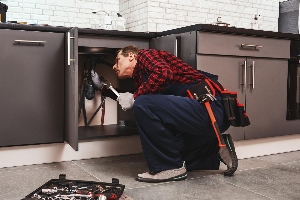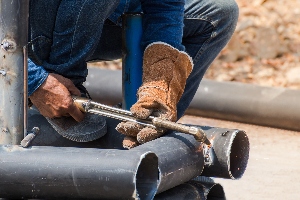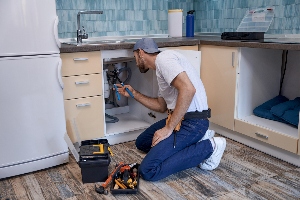Deciding to replace your water heater can be a significant investment, but it can also lead to substantial savings and increased energy efficiency for your home. The key to making the right choice involves considering the different types of water heaters, such as traditional tank, tankless, heat pump, and solar models. Each type has its pros and cons in terms of upfront costs, operational efficiency, and longevity.
Understanding your daily hot water needs and budget constraints can help narrow down the options. For instance, tankless water heaters generally offer more energy savings as they provide hot water on demand. Meanwhile, heat pump water heaters, which utilize existing heat in the air or ground, can be an excellent choice for those in warmer climates due to their superior energy efficiency.
Explore our Water Heater Replacement Options.
Understanding Water Heater Types
Choosing the right water heater involves knowing the different types available, their unique features, and how they can impact your energy savings and efficiency. Each type has its own advantages and best-use scenarios to consider.
Tank-Style Water Heaters
Tank-Style Water Heaters are the most traditional and widely used type. They store a large volume of water in a tank that is constantly heated. These units are generally less expensive upfront and come in both electric and gas models.
- Electric Models: More energy-efficient but may have higher operating costs.
- Gas Models: Higher initial cost but lower operating costs due to natural gas prices.
Tankless Water Heaters
Tankless Water Heaters provide hot water on demand without storing it. They are compact and can be more energy-efficient by heating water only when needed.
- Advantages: Space-saving, continuous hot water supply, lower energy bills.
- Considerations: Higher initial cost and might require upgrades to your home's gas line or electrical system.
Heat Pump Water Heaters
Heat Pump Water Heaters use electricity to move heat from the air or ground to heat water, making them highly energy-efficient.
- Pros: Lower operating costs, environmentally friendly.
- Cons: Higher initial investment, need for adequate installation space.
This type is ideal for those looking to reduce their carbon footprint.
Solar Water Heaters
Solar Water Heaters use energy from the sun to heat water, which can significantly reduce your energy bills and environmental impact.
- Benefits: Sustainability, potential savings on energy bills.
- Drawbacks: High initial cost, dependent on sunny weather and geographical location.
Indirect Water Heaters
Indirect Water Heaters use your home’s existing boiler or furnace to heat water, transferring heat to the water through a heat exchanger.
- Benefits: Efficient if you already have a boiler, reliable hot water supply.
- Drawbacks: Dependent on the boiler’s operation, might not be suitable for all homes.
Condensing Water Heaters
Condensing Water Heaters are a type of gas water heater that uses the exhaust gases to heat the water, improving efficiency.
- Advantages: Energy-efficient, good for homes with high hot water demands.
- Disadvantages: Higher upfront cost, requires a proper venting system.
Factors to Consider When Replacing a Water Heater
When replacing a water heater, it is crucial to evaluate several key factors to ensure you make the best decision for your home. These factors include energy efficiency, costs, fuel type, size, and lifespan.
Energy Efficiency
Energy efficiency is paramount when choosing a new water heater. Modern units come with energy ratings that indicate how efficiently they use power. Opting for a more energy-efficient unit can significantly reduce your energy bills over time. Look for the Energy Star label, which signifies higher efficiency standards. Tankless water heaters tend to be more efficient because they only heat water on demand, avoiding the standby heat losses associated with traditional tank heaters.
Cost Considerations
Initial purchase cost is just one aspect of the overall expense. You should also consider the long-term operating costs. While high-efficiency models may have a higher upfront cost, their reduced energy usage can lead to significant savings over time. Additionally, factor in installation costs, which can vary depending on the complexity of the setup and the specific requirements of your home. Regular maintenance costs are another important consideration.
Fuel Type and Availability
The fuel type you choose impacts both the cost and efficiency of your water heater. Common options include electricity, natural gas, propane, and solar power. Your choice may depend on what energy sources are readily available in your area. For instance, in some regions, natural gas is more affordable and efficient than electricity. Be sure to evaluate what fuel types are accessible and cost-effective for you.
Size and Capacity
Selecting the right size and capacity is crucial for meeting your household’s hot water demands. Water heaters come in various sizes, typically measured in gallons for tank models or flow rate for tankless models. An undersized unit will struggle to provide enough hot water, while an oversized unit can lead to unnecessary energy wastage. It’s important to accurately estimate your daily hot water usage to choose a model that fits your needs.
Duration and Lifespan
Consider the lifespan of the water heater. Tankless water heaters generally last longer than traditional tank models, often exceeding 20 years with proper maintenance. Traditional tank water heaters typically last about 10-15 years. Evaluating the expected lifespan helps you understand the long-term value of your investment. Frequent maintenance can extend the longevity of any water heater, ensuring it operates efficiently for as long as possible.
Water Heater Installation
This section details the crucial aspects of installing a new water heater, including the installation process, plumbing considerations, and venting requirements. Ensuring a proper installation can save you time, money, and headaches down the road.
Installation Process
Installing a water heater starts with selecting the right unit size based on your household's needs. Next, turn off the main water supply and water heater power source.
Steps to Install:
- Remove the old heater: Drain, disconnect and remove it.
- Position the new heater: Place it in the same area.
- Connect water supply: Using the appropriate pipes and ensuring no leaks.
- Install fittings and valves: Attach temperature, pressure relief valves.
- Reconnect power or gas supply: Check connections carefully.
Plumbing Considerations
Proper plumbing is pivotal for the efficient operation of your water heater. The existing system might require upgrades to accommodate the new heater, especially with differences in size or efficiency.
Key Points:
- Pipe Size: Must match the water heater's inlet/outlet for optimal flow.
- Water Pressure: Ensure it is within the recommended range.
- Backflow Prevention: Use check valves if necessary.
Venting Requirements
Venting is vital for gas water heaters, as it removes harmful gases produced during operation. Venting systems must comply with local building codes to ensure safety and efficiency.
Venting Options:
- Atmospheric Venting: Uses gravity to expel gases through a vertical flue.
- Power Venting: Employs a fan to push gases out horizontally.
- Direct Venting: Brings in outside air for combustion and expels gases outside.
Materials used in venting must be compatible with your heater system. This might need specialized adjustments, making professional installation essential. Incorrect venting can lead to dangerous conditions, so consult professionals.
Performance and Maintenance
Ensuring optimal performance and conducting regular maintenance of your water heater can extend its lifespan, improve energy efficiency, and help you avoid sudden breakdowns. Identifying and resolving issues promptly can also minimize risks such as leaks and costly repairs.
Maximizing Performance
To maximize the performance of your water heater, it is essential to monitor and adjust the thermostat settings. Set the thermostat to around 120°F for optimal energy efficiency and safety. Insulating your water heater and pipes can reduce heat loss, leading to lower energy bills.
Regularly check for any signs of mineral build-up, which can affect heating efficiency. Flushing the tank annually can help remove sediment that may accumulate, ensuring consistent performance. If you notice any unusual noises, it may indicate the presence of sediment or pressure issues, which require professional attention.
Routine Maintenance
Routine maintenance tasks are essential for keeping your water heater in good working condition. Inspect the anode rod every year and replace it if it is significantly corroded to prevent tank corrosion. Check and test the temperature and pressure relief valve to ensure it is functioning correctly and does not leak.
Drain a few gallons of water from the tank periodically to remove sediment, which can build up and decrease efficiency. If your water heater has a drain valve, ensure it is working correctly to facilitate this process.
Troubleshooting Common Issues
Some common water heater problems include leaks, insufficient hot water, and irregular water temperatures. Begin troubleshooting by checking the thermostat settings and ensuring they are properly adjusted. Inspect the heating elements for continuity and replace them if faulty.
Leaks are often caused by loose connections, worn-out parts, or a faulty drain valve. Tighten any loose connections and check the valve for damage. If the valve is leaking, replacing it can resolve the issue.
Inconsistent water temperatures may result from sediment build-up in the tank or faulty thermostats. Flushing the tank to remove sediment and replacing defective thermostats can restore consistent performance.
Selecting a Water Heater Replacement
When selecting a water heater replacement, you have several options. Traditional tank water heaters are common, storing 30-50 gallons of water and typically operating on gas or electricity. Tankless water heaters provide hot water on demand and can be more energy-efficient.
Energy efficiency is crucial. Look for models with high efficiency standards to reduce long-term energy costs. Some models even come with Energy Star ratings, which can offer rebates and further savings.
You should consider the purchase price and long-term savings. While tankless models may have a higher initial cost, they often prove more efficient and cost-effective over time. Traditional models tend to have a lower upfront price but may incur higher utility costs.
Fuel type is another factor. Gas water heaters generally heat water faster and can be more economical in the long run, even though the installation might be more complex. Electric water heaters are easier to install and might have lower maintenance costs but can be more expensive to operate.
Financial Considerations
When replacing your water heater, financial considerations are crucial. Key points to evaluate include calculating costs and potential savings, as well as exploring various financing options.
Calculating Costs and Savings
Understanding the initial cost of different types of water heaters is essential. Traditional tank water heaters tend to be less expensive upfront compared to tankless models or solar water heaters. However, tankless options often provide long-term savings due to their higher efficiency and lower energy costs.
Energy costs play a significant role in your long-term expenses. For example, electric heat pump water heaters often have lower energy costs due to their high efficiency ratings. Installation costs also vary; tankless water heaters may require more complex installations, increasing labor expenses.
Considering these factors helps you make an informed decision that balances upfront investment with long-term savings, ensuring you select the water heater that best fits your budget and needs.
Financing Options
Several financing options are available to ease the financial burden of replacing your water heater. Many homeowners choose to finance through home improvement loans, which can offer reasonable interest rates. Alternatively, manufacturer rebates or utility company incentives might be available, particularly for energy-efficient models like solar or heat pump water heaters.
Leasing options exist as well, which might include maintenance and service as part of the monthly fee, reducing upfront costs and providing predictable expenses.
Environmental Impact and Regulations
Choosing the right water heater involves considering environmental impacts and adhering to energy regulations that can influence your home's efficiency and sustainability.
Energy Regulations
Energy regulations play a significant role in dictating the operational standards of water heaters. These regulations are established by entities such as the U.S. Department of Energy (DOE), which sets forth efficiency standards aimed at reducing overall energy consumption.
Water heaters must meet specific guidelines, such as the Energy Star rating, which signifies a higher level of energy efficiency. This can lead to lower energy bills and energy cost savings.
Environmental Benefits
Opting for energy-efficient water heaters offers notable environmental benefits. Modern units, especially those utilizing solar energy or having a high energy efficiency rating, reduce the carbon footprint by consuming less power and emitting fewer greenhouse gases.
Solar energy water heaters, in particular, are an excellent choice for sustainable living and can significantly decrease reliance on fossil fuels.
By choosing One Call Plumbing, you ensure the installation and maintenance of eco-friendly water heaters that offer environmental benefits while contributing to global warming mitigation. This not only makes your home greener but also supports broader environmental conservation efforts.












